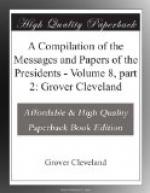The revenues of the Government during the fiscal year ending June 30, 1877, were $269,000,586.62; the total expenditures for the same period were $238,660,008.93, leaving a surplus revenue of $30,340,577.69. This has substantially supplied the requirements of the sinking fund for that year. The estimated revenues of the current fiscal year are $265,500,000, and the estimated expenditures for the same period are $232,430,643.72. If these estimates prove to be correct, there will be a surplus revenue of $33,069,356.28—an amount nearly sufficient for the sinking fund for that year. The estimated revenues for the next fiscal year are $269,250,000. It appears from the report that during the last fiscal year the revenues of the Government, compared with the previous year, have largely decreased. This decrease, amounting to the sum of $18,481,452.54, was mainly in customs duties, caused partly by a large falling off of the amount of imported dutiable goods and partly by the general fall of prices in the markets of production of such articles as pay ad valorem taxes.
While this is felt injuriously in the diminution of the revenue, it has been accompanied with a very large increase of exportations. The total exports during the last fiscal year, including coin, have been $658,637,457, and the imports have been $492,097,540, leaving a balance of trade in favor of the United States amounting to the sum of $166,539,917, the beneficial effects of which extend to all branches of business.
The estimated revenue for the next fiscal year will impose upon Congress the duty of strictly limiting appropriations, including the requisite sum for the maintenance of the sinking fund, within the aggregate estimated receipts.
While the aggregate of taxes should not be increased, amendments might be made to the revenue laws that would, without diminishing the revenue, relieve the people from unnecessary burdens. A tax on tea and coffee is shown by the experience not only of our own country, but of other countries, to be easily collected, without loss by undervaluation or fraud, and largely borne in the country of production. A tax of 10 cents a pound on tea and 2 cents a pound on coffee would produce a revenue exceeding $12,000,000, and thus enable Congress to repeal a multitude of annoying taxes yielding a revenue not exceeding that sum. The internal-revenue system grew out of the necessities of the war, and most of the legislation imposing taxes upon domestic products under this system has been repealed. By the substitution of a tax on tea and coffee all forms of internal taxation may be repealed, except that on whisky, spirits, tobacco, and beer. Attention is also called to the necessity of enacting more vigorous laws for the protection of the revenue and for the punishment of frauds and smuggling. This can best be done by judicious provisions that will induce the disclosure of attempted fraud by undervaluation and smuggling. All revenue laws should be simple in their provisions and easily understood. So far as practicable, the rates of taxation should be in the form of specific duties, and not ad valorem, requiring the judgment of experienced men to ascertain values and exposing the revenue to the temptation of fraud.




